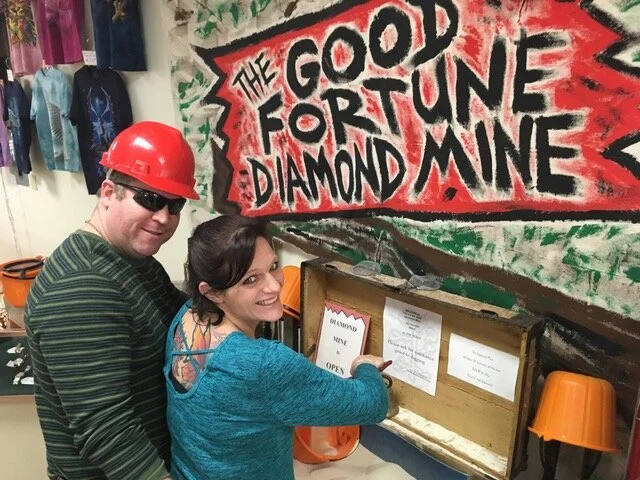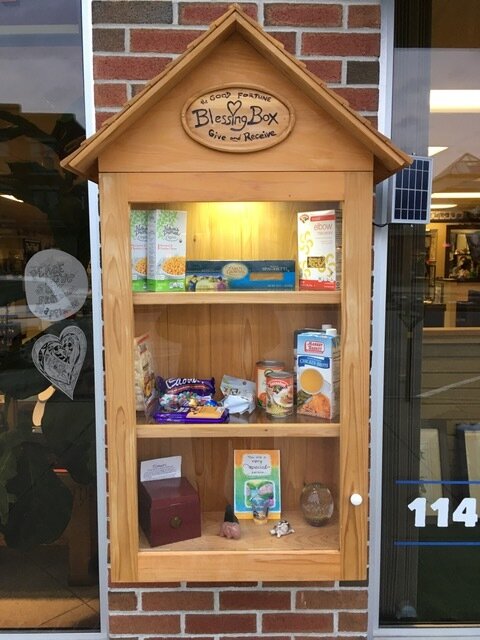The owner of Good Fortune Jewelry & Pawn in Keene is hoping to be at the forefront of a switch to second-hand jewelry.
By Kelly Burch, Granite State News Collaborative
At Good Fortune Jewelry & Pawn in Keene, shoppers can try their luck at scooping sand that contains small diamonds. The proceeds from each scoop purchased are donated to local charities. (Courtesy photo).
At the very beginning of March 2020, when there were relatively few cases of coronavirus in the Granite State, Roger Weinreich, president of Good Fortune Jewelry & Pawn in Keene, caught the virus. That, coupled with his conversations with business contacts in Asia, prompted Weinreich to shut down his shop even before the governor issued a stay at home order. Weinreich hoped he could lead by example and help the U.S. get ahead of the pandemic.
“We optimistically thought, ‘let’s shut down for 60 days,’” Weinreich said.
He urged others in his region and his industry to do the same, but it soon became clear that the impacts of the pandemic would last much longer than two months.
When Good Fortune reopened eight weeks later, it was by appointment only. During a typical weekend day pre-pandemic, 50 people might be in the store. With appointments, Weinreich had only 5 staff working, each meeting with a person or two at a time. Although the number of customers was down, the percentage who made a purchase rose.
“We were doing less sales, but my staff felt more empowered and emboldened, because people were coming in to actually [buy] things,” Weinreich said.
Customers, some of whom travel to Good Fortune from Boston or Connecticut, also appreciated the higher-end experience of personal shopping for pre-owned jewelry at Good Fortune. When a person booked an appointment, they shared what they were looking for. Weinreich’s staff would send them photos of pieces ahead of time, and pull specific pieces for when they arrived in the showroom. That made the whole shopping experience faster and more efficient.
“Everybody’s time is so valuable,” Weinreich said. “That’s one of the reasons online selling or Amazon works so well.”
Having appointments allowed Good Fortune to be just as convenient. The store even started doing same-day delivery for customers in Keene. As stimulus payments provided more Americans with cash, Weinreich noticed an uptick in the number of people shopping for jewelry and fewer people coming in looking to sell or pawn their items.
Roger Weinreich, president of Good Fortune Jewelry & Pawn in Keene, says he tries to give back to the local community through initiatives like the Blessing Box, which offers free food outside the store. (Courtesy photo).
“We saw more people looking to acquire,” Weinreich said. “From our vantage point, a lot of people were helped by [government] programs, and in general we haven’t seen lots of people liquidating.”
As government support during the pandemic tapers off, Weinreich expects to see more people looking for pawn loans. The short-term loans, with an average value of $100-$200, are often a stop-gap for people who need money in a pinch but don’t have many options for getting it.
“A pawn transaction is helpful when people don't have a family member to turn to,” Weinreich said. In almost all cases, the pawned item is picked up before the 30 day loan expires. If it isn’t, Good Fortune will hang on to the item for another 90 days before listing it for sale, giving the lender another chance to reclaim their item.
“The bank doesn't want to foreclose and neither do we,” he said. “We want people to repeat the loan.”
The large majority of jewelry that Good Fortune sells is bought from previous owners outright or sold on commission. With major national chains like Kay Jewelers and Zales leading the way in rebranding the idea of “pre-owned” (rather than ‘used’) jewelry, Weinreich expects the sector to grow in the coming years.
“The public has always been happy with used cars and houses, everything… but not jewelry,” Weinreich said. “Now, there’s been a shift. Once [big] jewelers move into this, and we believe they’re going to, the future of the industry is going to change.”
To stay ahead of that, Weinreich invested in revamping his website, appealing to a national audience. He doesn’t anticipate the Keene location of Good Fortune disappearing, but he expects that online sales will continue to grow.
“We like to span the two worlds of brick and mortar and online,” he said.
Although he’ll soon be letting more people into the store, Weinreich said he will continue to encourage customers to book appointments for transactions, something he never would have considered doing before the pandemic.
“Doctors, dentists and lawyers have long understood the value of hosting visits by appointment only for specific procedures and meetings,” he said. “Providing attentive service to a couple shopping for their engagement ring or for a family applying for a loan is no less important.”
During the pandemic, Weinreich started a “blessing box,” with free food and necessities outside the shop. At Good Fortune’s “Diamond Mine,” people can purchase the opportunity to scoop sand, which has small diamonds buried in it. They keep anything they find, and the proceeds are donated to local charity. Since Good Fortune works with many people who do not have ample financial resources, Weinreich feels it’s important to give back.
“When it comes to people who don't have the resources, second hand is a good way to go,” he said.
This story is part of the 50 Businesses, 50 Solutions series, shared by partners in The Granite State News Collaborative, that aims to highlight how business leaders across the state, from mom and pop shops, to large corporations have adapted to meet the challenges and disruptions caused by the novel coronavirus in the hopes others may be able to replicate these ideas and innovations. For more information visit collaborativenh.org.


